

You Can't Have a Coaching Culture Without a Structure. Results-Based Coaching Tool (10/31/17) How to Get Feedback on Your Coaching - Bright Morning. Strategies for Instructional Coaching. As a coach, I have worked with teachers to help them become better educators, but I have also coached coaches to become better facilitators so that they can, in turn, better coach their teachers.
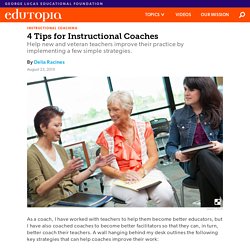
A wall hanging behind my desk outlines the following key strategies that can help coaches improve their work: Go Slow to Go Fast As coaches, we must go slow to go fast. Coaches come across dozens of strategies in books and social media. I tend to bookmark the ones I find interesting with teachers in mind who might want to use them, but these methods are effective only if they align with the school culture. Offering ideas is valuable, but relationship building must come first. Listen for the Request in the Complaint As coaches, we hear complaints from teachers, administrators, students, and other coaches.
One common complaint is "I can't get through all of this curriculum. Assume Positive Intentions What we tell ourselves may matter as much as the conversations we have with each other. Bringing Empathy to Coaching. Shasta Looper, Balanced Literacy Coach from Greenville County Schools in South Carolina, shares the significance of empathy in coaching and provides strategies for promoting empathy with coachees. our years ago when I stepped out of the classroom to become a coach, I had grandiose ideas of what I would be able to accomplish.
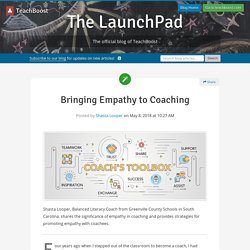
A goal of mine was to save the world from poor instruction. While my classroom experience led to excellent content knowledge, there were lessons that I still needed to learn as a new coach—some were easier than others to be honest. Of those that were the most difficult, utilizing empathy in coaching was by far the hardest to learn, yet it was something that could not be taught by anyone and that I had to learn in the trenches. As a classroom teacher, approaching student learning with empathy is second nature.
Tips for Promoting Empathy 1) Set Aside Your Assumptions When starting as a coach, everyone brings their own personal ideas and philosophies to the table. You Can't Have a Coaching Culture Without a Structure. How Can a Coach Gain a Teacher's Trust? - Bright Morning. A question I’m often asked at this time of year when relationships are being formed is: How can I gain the trust of the teachers I’m working with?
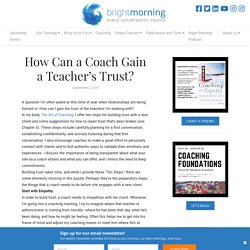
In my book, The Art of Coaching, I offer ten steps for building trust with a new client and some suggestions for how to repair trust that’s been broken (see Chapter 5). These steps include carefully planning for a first conversation, establishing confidentiality, and actively listening during that first conversation. I also encourage coaches to make a great effort to personally connect with clients and to find authentic ways to validate their emotions and experiences. I discuss the importance of being transparent about what your role as a coach entails and what you can offer, and I stress the need to keep commitments.
Building trust takes time, and while I provide these “Ten Steps,” there are some elements missing in this puzzle. Grow a Coaching Relationship from the Ground Up. Coaching Protocol Toolbox. ORID discussion method. Tuning. About Learning from Student Work – School Reform Initiative. Microsoft Partners in Learning. How can your colleagues be involved in your coaching work?
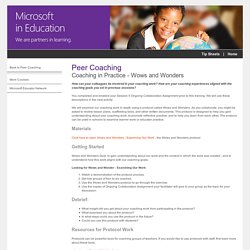
How are your coaching experiences aligned with the coaching goals you set in previous sessions? You completed and emailed your Session 5 Ongoing Collaboration Assignment prior to this training. We will use these descriptions in the next activity. We will examine our coaching work in depth using a protocol called Wows and Wonders. As you collaborate, you might be asked to review lesson plans, scaffolding tools, and other written documents. Materials. PZ's Thinking Routines Toolbox. Welcome to Project Zero’s Thinking Routines Toolbox.
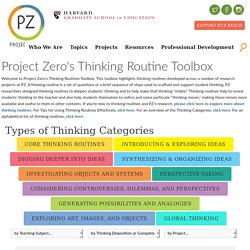
This toolbox highlights Thinking Routines developed across a number of research projects at PZ. A thinking routine is a set of questions or a brief sequence of steps used to scaffold and support student thinking. If you're new to thinking routines and PZ's research, please click here to explore more about thinking routines. A vast array of PZ's work has explored the development of thinking, the concept of thinking dispositions, and the many ways routines can be used to support student learning and thinking across age groups, disciplines, ideals, competencies, and populations.
Thinking Routines originated in PZ’s Visible Thinking research initiative. Project Zero’s broader work on Visible Thinking can be defined as a flexible and systematic research-based approach to integrating the development of students' thinking with content learning across subject matters. Thinking routines exist in all classrooms. The Power of Protocols for Equity. Making Protocols Work.
Measuring the Impact of Student-Centered Coaching. Empathy » Instructional Coaching Group. The Secrets of Highly Successful Groups - with Dan Coyle by The 1-3-20 Podcast. How Coaching Can Impact Teachers, Principals, and Students. The following is an excerpt from my new book, The Art of Coaching: Effective Strategies for School Transformation.
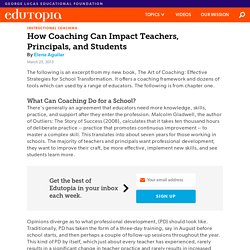
It offers a coaching framework and dozens of tools which can used by a range of educators. The following is from chapter one. What Can Coaching Do for a School? There's generally an agreement that educators need more knowledge, skills, practice, and support after they enter the profession. Malcolm Gladwell, the author of Outliers: The Story of Success (2008), calculates that it takes ten thousand hours of deliberate practice -- practice that promotes continuous improvement -- to master a complex skill.
Coaching is an essential component of an effective professional development program. How to Level Up As a Coach - Bright Morning. Leveling up as a coach grows your impact.
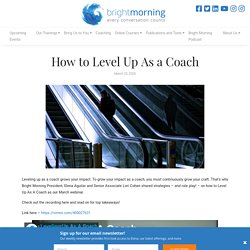
To grow your impact as a coach, you must continuously grow your craft. That’s why Bright Morning President, Elena Aguilar and Senior Associate Lori Cohen shared strategies – and role play! – on how to Level Up As A Coach as our March webinar. Check out the recording here and read on for top takeaways! Transformational Coaching Rubric.